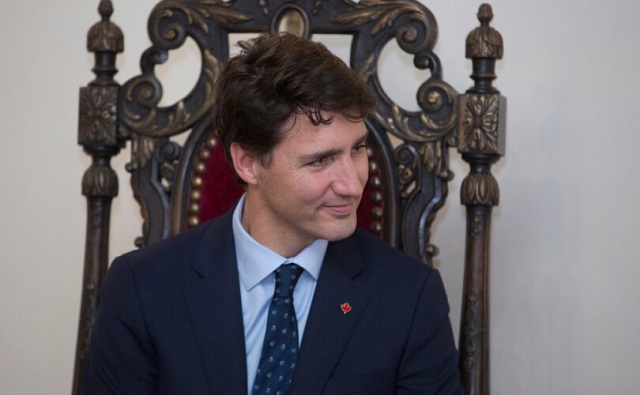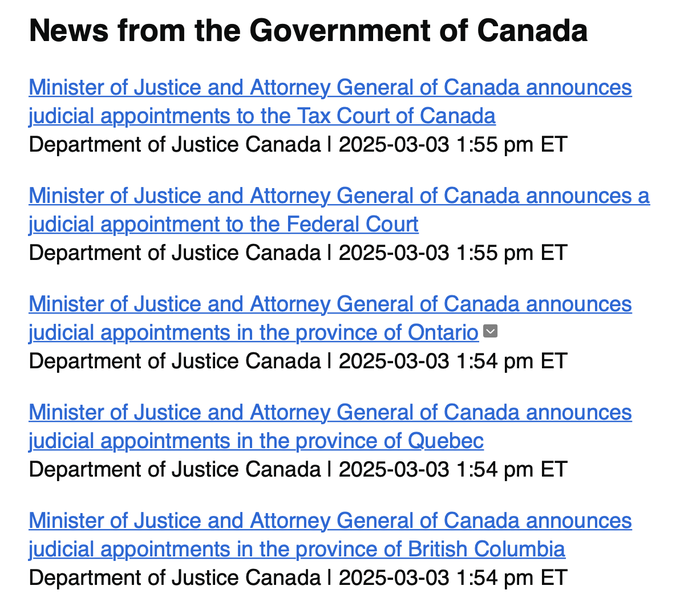National
Trudeau fills Canadian courts with Liberal-appointed judges before resigning as prime minister

From LifeSiteNews
Justin Trudeau’s Minister of Justice announced 20 judicial appointments of Liberal-leaning judges to various Canadians courts in just one day.
Prime Minister Justin Trudeau is stacking Canadian courts with Liberal judges before he steps down as Liberal leader.
On March 3, the Minister of Justice and Attorney General Arif Virani, under the direction of Trudeau, announced 20 judicial appointments of Liberal-leaning judges to various Canadians courts just weeks before Trudeau is expected to leave office.
The announcements include appointments to the Tax Court of Canada, the Federal Court, and the provincial courts of Ontario, Quebec, and British Columbia.
Indeed, according to government information from Blacklock’s Reporter, Trudeau’s last days in office have been busy. Since announcing his resignation on January 6, Trudeau has made 104 federal appointments, including judges, diplomats, “special advisors,” and federal boards.
In just the past two months, Trudeau has named Liberal appointees to the Canada Council for the Arts, Canadian Air Transport Security Authority, Canadian Broadcasting Corporation, Canadian Centre for Occupational Health, Canadian Cultural Property Expert Review Board, Canadian Energy Regulator, Canadian High Arctic Research Station, Canadian Museum of Nature, Canadian Race Relations Foundation, and Canadian Radio Television and Telecommunications Commission.
Notably, none of Trudeau’s 104 appointments can be challenged, as he suspended Parliament until March 24. This maneuver buys the Liberal Party a couple months’ time to select a new leader and rebrand their government.
As it stands, Trudeau is scheduled to stay on as prime minister until Liberals elect a new leader at an internal election scheduled for March 9.
Campaign Life Coalition’s Pete Baklinski responded to Trudeau’s judicial appointments on X, saying, “Nothing to see here. Trudeau, before he’s gone, is only stacking the courts across Canada with judges who think like he does. Business as usual. Move on.”
During his time in office, Trudeau has become well-known for appointing Liberal-friendly judges to Canadian courts. Judicial appointments have become increasingly important in recent years, as many Canadians are forced to defend their basic freedoms in the courts.
In September 2024, a Trudeau-appointed judge sentenced Freedom Convoy-inspired protesters to six years in prison for their part in the protest against COVID mandates.
Similarly, in November, a Trudeau-appointed Ontario judge dismissed an appeal from Toronto Catholic District School Board Trustee Mike Del Grande to drop charges for having objected to adding “gender identity” and “gender expression” as protected classes in the Toronto Catholic board’s code of conduct policy.
Business
Most Canadians say retaliatory tariffs on American goods contribute to raising the price of essential goods at home

- 77 per cent say Canada’s tariffs on U.S. products increase the price of consumer goods
- 72 per cent say that their current tax bill hurts their standard of living
A new MEI-Ipsos poll published this morning reveals a clear disconnect between Ottawa’s high-tax, high-spending approach and Canadians’ level of satisfaction.
“Canadians are not on board with Ottawa’s fiscal path,” says Samantha Dagres, communications manager at the MEI. “From housing to trade policy, Canadians feel they’re being squeezed by a government that is increasingly an impediment to their standard of living.”
More than half of Canadians (54 per cent) say Ottawa is spending too much, while only six per cent think it is spending too little.
A majority (54 per cent) also do not believe federal dollars are being effectively allocated to address Canada’s most important issues, and a similar proportion (55 per cent) are dissatisfied with the transparency and accountability in the government’s spending practices.
As for their own tax bills, Canadians are equally skeptical. Two-thirds (67 per cent) say they pay too much income tax, and about half say they do not receive good value in return.
Provincial governments fared even worse. A majority of Canadians say they receive poor value for the taxes they pay provincially. In Quebec, nearly two-thirds (64 per cent) of respondents say they are not getting their money’s worth from the provincial government.
Not coincidentally, Quebecers face the highest marginal tax rates in North America.
On the question of Canada’s response to the U.S. trade dispute, nearly eight in 10 Canadians (77 per cent) agree that Ottawa’s retaliatory tariffs on American products are driving up the cost of everyday goods.
“Canadians understand that tariffs are just another form of taxation, and that they are the ones footing the bill for any political posturing,” adds Ms. Dagres. “Ottawa should favour unilateral tariff reduction and increased trade with other nations, as opposed to retaliatory tariffs that heap more costs onto Canadian consumers and businesses.”
On the issue of housing, 74 per cent of respondents believe that taxes on new construction contribute directly to unaffordability.
All of this dissatisfaction culminates in 72 per cent of Canadians saying their overall tax burden is reducing their standard of living.
“Taxpayers are not just ATMs for government – and if they are going to pay such exorbitant taxes, you’d think the least they could expect is good service in return,” says Ms. Dagres. “Canadians are increasingly distrustful of a government that believes every problem can be solved with higher taxes.”
A sample of 1,020 Canadians 18 years of age and older was polled between June 17 and 23, 2025. The results are accurate to within ± 3.8 percentage points, 19 times out of 20.
The results of the MEI-Ipsos poll are available here.
* * *
The MEI is an independent public policy think tank with offices in Montreal, Ottawa, and Calgary. Through its publications, media appearances, and advisory services to policymakers, the MEI stimulates public policy debate and reforms based on sound economics and entrepreneurship.
Business
B.C. premier wants a private pipeline—here’s how you make that happen

From the Fraser Institute
By Julio Mejía and Elmira Aliakbari
At the federal level, the Carney government should scrap several Trudeau-era policies including Bill C-69 (which introduced vague criteria into energy project assessments including the effects on the “intersection of sex and gender with other identity factors”)
The Eby government has left the door (slightly) open to Alberta’s proposed pipeline to the British Columbia’s northern coast. Premier David Eby said he isn’t opposed to a new pipeline that would expand access to Asian markets—but he does not want government to pay for it. That’s a fair condition. But to attract private investment for pipelines and other projects, both the Eby government and the Carney government must reform the regulatory environment.
First, some background.
Trump’s tariffs against Canadian products underscore the risks of heavily relying on the United States as the primary destination for our oil and gas—Canada’s main exports. In 2024, nearly 96 per cent of oil exports and virtually all natural gas exports went to our southern neighbour. Clearly, Canada must diversify our energy export markets. Expanded pipelines to transport oil and gas, mostly produced in the Prairies, to coastal terminals would allow Canada’s energy sector to find new customers in Asia and Europe and become less reliant on the U.S. In fact, following the completion of the Trans Mountain Pipeline expansion between Alberta and B.C. in May 2024, exports to non-U.S. destinations increased by almost 60 per cent.
However, Canada’s uncompetitive regulatory environment continues to create uncertainty and deter investment in the energy sector. According to a 2023 survey of oil and gas investors, 68 per cent of respondents said uncertainty over environmental regulations deters investment in Canada compared to only 41 per cent of respondents for the U.S. And 59 per cent said the cost of regulatory compliance deters investment compared to 42 per cent in the U.S.
When looking at B.C. specifically, investor perceptions are even worse. Nearly 93 per cent of respondents for the province said uncertainty over environmental regulations deters investment while 92 per cent of respondents said uncertainty over protected lands deters investment. Among all Canadian jurisdictions included in the survey, investors said B.C. has the greatest barriers to investment.
How can policymakers help make B.C. more attractive to investment?
At the federal level, the Carney government should scrap several Trudeau-era policies including Bill C-69 (which introduced vague criteria into energy project assessments including the effects on the “intersection of sex and gender with other identity factors”), Bill C-48 (which effectively banned large oil tankers off B.C.’s northern coast, limiting access to Asian markets), and the proposed cap on greenhouse gas (GHG) emissions in the oil and gas sector (which will likely lead to a reduction in oil and gas production, decreasing the need for new infrastructure and, in turn, deterring investment in the energy sector).
At the provincial level, the Eby government should abandon its latest GHG reduction targets, which discourage investment in the energy sector. Indeed, in 2023 provincial regulators rejected a proposal from FortisBC, the province’s main natural gas provider, because it did not align with the Eby government’s emission-reduction targets.
Premier Eby is right—private investment should develop energy infrastructure. But to attract that investment, the province must have clear, predictable and competitive regulations, which balance environmental protection with the need for investment, jobs and widespread prosperity. To make B.C. and Canada a more appealing destination for investment, both federal and provincial governments must remove the regulatory barriers that keep capital away.
-

 COVID-194 hours ago
COVID-194 hours agoFDA requires new warning on mRNA COVID shots due to heart damage in young men
-

 Business2 hours ago
Business2 hours agoCarney’s new agenda faces old Canadian problems
-

 Indigenous3 hours ago
Indigenous3 hours agoInternal emails show Canadian gov’t doubted ‘mass graves’ narrative but went along with it
-

 Bruce Dowbiggin5 hours ago
Bruce Dowbiggin5 hours agoEau Canada! Join Us In An Inclusive New National Anthem
-

 Also Interesting2 days ago
Also Interesting2 days ago9 Things You Should Know About PK/PD in Drug Research
-

 Business2 days ago
Business2 days agoCannabis Legalization Is Starting to Look Like a Really Dumb Idea
-

 Bruce Dowbiggin2 days ago
Bruce Dowbiggin2 days agoThe Covid 19 Disaster: When Do We Get The Apologies?
-

 Media2 days ago
Media2 days agoCBC journalist quits, accuses outlet of anti-Conservative bias and censorship







